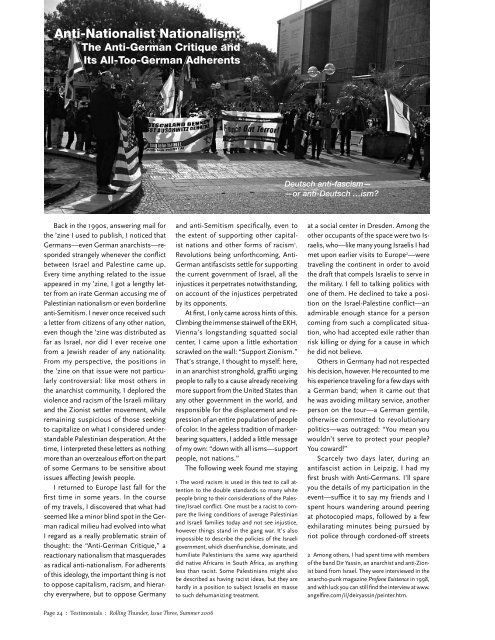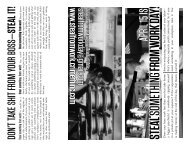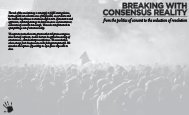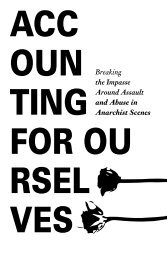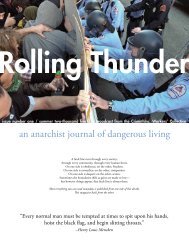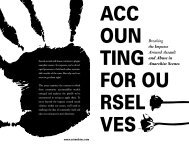Rolling Thunder - CrimethInc
Rolling Thunder - CrimethInc
Rolling Thunder - CrimethInc
Create successful ePaper yourself
Turn your PDF publications into a flip-book with our unique Google optimized e-Paper software.
Anti-Nationalist Nationalism:The Anti-German Critique andIts All-Too-German AdherentsBack in the 1990s, answering mail forthe ’zine I used to publish, I noticed thatGermans—even German anarchists—respondedstrangely whenever the conflictbetween Israel and Palestine came up.Every time anything related to the issueappeared in my ’zine, I got a lengthy letterfrom an irate German accusing me ofPalestinian nationalism or even borderlineanti-Semitism. I never once received sucha letter from citizens of any other nation,even though the ’zine was distributed asfar as Israel, nor did I ever receive onefrom a Jewish reader of any nationality.From my perspective, the positions inthe ’zine on that issue were not particularlycontroversial: like most others inthe anarchist community, I deplored theviolence and racism of the Israeli militaryand the Zionist settler movement, whileremaining suspicious of those seekingto capitalize on what I considered understandablePalestinian desperation. At thetime, I interpreted these letters as nothingmore than an overzealous e¤ort on the partof some Germans to be sensitive aboutissues a¤ecting Jewish people.I returned to Europe last fall for thefirst time in some years. In the courseof my travels, I discovered that what hadseemed like a minor blind spot in the Germanradical milieu had evolved into whatI regard as a really problematic strain ofthought: the “Anti-German Critique,” areactionary nationalism that masqueradesas radical anti-nationalism. For adherentsof this ideology, the important thing is notto oppose capitalism, racism, and hierarchyeverywhere, but to oppose GermanyPage 24 : Testimonials : <strong>Rolling</strong> <strong>Thunder</strong>, Issue Three, Summer 2006and anti-Semitism specifically, even tothe extent of supporting other capitalistnations and other forms of racism 1 .Revolutions being unforthcoming, Anti-German antifascists settle for supportingthe current government of Israel, all theinjustices it perpetrates notwithstanding,on account of the injustices perpetratedby its opponents.At first, I only came across hints of this.Climbing the immense stairwell of the EKH,Vienna’s longstanding squatted socialcenter, I came upon a little exhortationscrawled on the wall: “Support Zionism.”That’s strange, I thought to myself: here,in an anarchist stronghold, graªti urgingpeople to rally to a cause already receivingmore support from the United States thanany other government in the world, andresponsible for the displacement and repressionof an entire population of peopleof color. In the ageless tradition of markerbearingsquatters, I added a little messageof my own: “down with all isms—supportpeople, not nations.”The following week found me staying1 The word racism is used in this text to call attentionto the double standards so many whitepeople bring to their considerations of the Palestine/Israelconflict. One must be a racist to comparethe living conditions of average Palestinianand Israeli families today and not see injustice,however things stand in the gang war. It’s alsoimpossible to describe the policies of the Israeligovernment, which disenfranchise, dominate, andhumiliate Palestinians the same way apartheiddid native Africans in South Africa, as anythingless than racist. Some Palestinians might alsobe described as having racist ideas, but they arehardly in a position to subject Israelis en masseto such dehumanizing treatment.Deutsch anti-fascism——or anti-Deutsch …ism?at a social center in Dresden. Among theother occupants of the space were two Israelis,who—like many young Israelis I hadmet upon earlier visits to Europe 2 —weretraveling the continent in order to avoidthe draft that compels Israelis to serve inthe military. I fell to talking politics withone of them. He declined to take a positionon the Israel-Palestine conflict—anadmirable enough stance for a personcoming from such a complicated situation,who had accepted exile rather thanrisk killing or dying for a cause in whichhe did not believe.Others in Germany had not respectedhis decision, however. He recounted to mehis experience traveling for a few days witha German band; when it came out thathe was avoiding military service, anotherperson on the tour—a German gentile,otherwise committed to revolutionarypolitics—was outraged: “You mean youwouldn’t serve to protect your people?You coward!”Scarcely two days later, during anantifascist action in Leipzig, I had myfirst brush with Anti-Germans. I’ll spareyou the details of my participation in theevent—suªce it to say my friends and Ispent hours wandering around peeringat photocopied maps, followed by a fewexhilarating minutes being pursued byriot police through cordoned-o¤ streets2 Among others, I had spent time with membersof the band Dir Yassin, an anarchist and anti-Zionistband from Israel. They were interviewed in theanarcho-punk magazine Profane Existence in 1998,and with luck you can still find the interview at www.angelfire.com/il/deiryassin/peinter.htm.and over spiked fences, and in the endthe scheduled fascist march was thwarted.After traveling throughout southern andeastern Europe, where fascism is gainingmore and more power, it was a real reliefto see it being held at bay somewhere.It was not so encouraging, however, tosee US, Israeli, and British flags beingunloaded at the departure point of anantifascist march.I went immediately over to the youngmen unloading them. My German friend hadurged me not to waste my time, but whetheror not they would listen to me I was curiouswhat they had to say for themselves.“What are you doing with that flag?” Igestured at the stars and stripes one youngfellow was pulling from the truck.“We are going to march with it.”“I’m from the United States,” I began,“and I can’t fucking believe you wouldmarch with a US flag at this rally. Don’tyou know what this flag means?”“But it is di¤erent here! Here, this flagis a symbol of the antifascist struggle.”“Listen, everywhere in the world thatflag represents the same things: Hollywood,Coca-Cola, the absolute power ofthe capitalist market. What does that haveto do with freedom?”His answer was almost plaintive. “ButBritain and the United States beat theGerman government! They were the onlyones who could do it. We carry their flagsto remember this.”“They fought that war with their armiessegregated into black and white divisions,and Japanese citizens in internmentcamps! They weren’t fighting for freedom,but for their own national power—just likein the genocidal wars against the NativeAmericans! That flag is stained with theblood of millions!”“But they were the only ones who couldstop the Nazis here,” he repeated, almostsheepishly. I hadn’t caught myself a particularlyfierce Anti-German.“That war only happened because peoplewere willing to march under flags inthe first place, and we could have wonit without flags if people like you didn’tinsist on them. If you’re going to marchwith that flag, count me out, and everyantifascist like me in the US would do thesame.” I left to find my own route to blockthe fascists—hence the crazy chase sceneinvolving the spiked fence.In these pictures you see(circle all that apply):That night, sporting a limp that lastedfor weeks, I stayed at a squat in Erfurt. Here,someone had gone around to every posterthat had read “Antifascist” and blackedout “fascist” to replace it with “Deutsch.”What kind of people thought it was moreimportant to take at stand against Deutschlandthan against fascism?It wasn’t until Hamburg, my last stop inGermany, that I got to have the discussionI’d wanted with a real live Anti-German. Itwas someone I knew: back in the ’90s, hehad booked my old punk rock band at asocial center in Germany. He was thinnernow, with a more haughty, intellectual airabout him and a pencil-thin moustache.“Yes,” he was saying, “but your newband is… not so good, yes?” He noddedto me, eyebrows raised.“We’re a new band,” I replied, gamely.“We’ve just learned new instruments. Overtime, I hope we’ll improve. But yes, rightnow, perhaps we are not so good.”“Your last band”—he paused for dramatice¤ect—“did not improve with time,I think. I saw you at the beginning of yourlast tour, and then at the end. Do youremember?”“Yes, of course. I agree.” Humility isthe better part of celebrity, if you want tolast an hour in punk circles.“You know,” he said, leaning his headback and looking into the middle distance,“I think when I first started to lose interest,a. a Jewish parent and an innocent childb. a Jewish parent and a prospective soldierc. an Arab parent and an innocent childd. an Arab parent and a potential terroristit was when the record came out with thesong about Intifada 3 .”“Aha!” I exclaimed, practically poundingmy fist upon the ubiquitous foosballtable—the game is known as “kicker” inGermany, and heaven help any foreignerwho takes on even the drunkest of nativeplayers. “An Anti-German! I’ve been waitingfor this! Let’s get down to business.”3 The o¤ending song, named “Called Terrorists byTerrorists,” was explained thus in the liner notes:“The title of this song refers to the well-knownmurder of United Nations mediator Count FolkeBernadotte, who was killed on orders from futureIsraeli politician Yitzhak Shamir. Bernadotte wasappointed in 1948 to negotiate between the Palestiniannatives and the Zionists who were attemptingto establish an Israeli state in their homeland; hewas the former head of the Swedish Red Cross, andhad risked his life to save thousands of Jews fromconcentration camps during the second world war.After months of studying the situation, Bernadotteconcluded that in the interests of human decency ifthe Zionists were to eventually be given sovereigntyover a part of Palestine, Palestinian refugees whohad been driven out by Zionist violence should begiven two options: they should be allowed to returnto their stolen lands, or else receive compensationfrom the new nation of Israel for what had beentaken from them. The day after he made his proposal,he was killed by Zionist terrorists carryingout Shamir’s instructions. Years later, supportedby a media blackout on the past and the fact thathistory is always written by the victors, Shamir wasable to join other world leaders in referring to thePalestinians who still resisted the racist repressionof his regime as ‘terrorists’ without anyone bringingup his own blood-soaked past.”<strong>Rolling</strong> <strong>Thunder</strong>, Issue Three, Summer 2006 : Testimonials : Page 25


